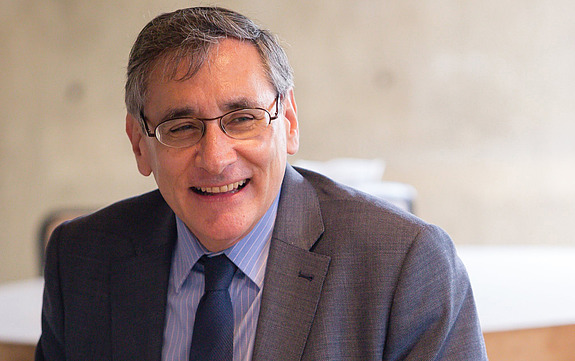IAS Hosts Lecture at Bloomberg’s London HQ Built Around Historic Roman Site
Press Contact

Angelos Chaniotis, Professor in the School of Historical Studies at the Institute for Advanced Study (IAS), will present “Mithras at Bloomberg: Memory Feeling, Faith” at Bloomberg’s new London Headquarters on May 22, 2019, at 6:00 p.m. (BST) discussing one of the UK’s most significant archaeological sites: a temple dedicated to the Roman god Mithras. The temple, or Mithraeum, which is located at the site of the Bloomberg building and was originally excavated in 1954, is one of many secretive houses of worship erected by the worshippers of Mithras in veneration of their god.
Taking place at the Bloomberg London Building, 3 Queen Victoria, London EC4N 4TQ, UK, the evening will be hosted by IAS Director and Leon Levy Professor Robbert Dijkgraaf, with opening remarks from London Mithraeum Bloomberg SPACE COO Helen Chiles.
Chaniotis’s talk will address how the Mithras cult, one of the most secretive, interesting, widespread, but also puzzling ancient cults, can be approached from the perspective of information sharing and emotional arousal.
“The Institute for Advanced Study’s School of Historical Studies has a long tradition and influence on the subject of ancient history, beginning with Founding Professor and Greek epigraphy specialist Benjamin Meritt in 1935,” stated IAS Director Dijkgraaf. “Angelos and his colleagues in the School continue to build on the legacy of Meritt among other past scholars as intrepid explorers of human culture and society.”
“Ancient mystery cults demonstrate a phenomenon that modern neuroscience confirms: the interdependence between attention, memory, emotion, and decision-making,” stated Chaniotis. “An image attracts attention; a memory stimulates emotions, and individuals are led to make certain life choices. This pattern remains evident from ancient religious practices to the way a news service spreads information today.”
Chaniotis, who joined the Institute Faculty in 2010, is engaged in wide-ranging research in the social, cultural, religious, legal, and economic history of the Hellenistic world and the Roman East. The author of many books and articles and senior editor of the Supplementum Epigraphicum Graecum, he has worked on war, religion, and strategies of persuasion in the ancient world. His current research focuses on emotions, memory, and identity. Significant questions and dialogues in the field have grown out of his contributions, which have helped to advance understanding of previously unexplored aspects of the ancient world.
Following his talk, Chaniotis will lead a tour of the London Mithraeum Bloomberg SPACE, a facility that creates an innovative museum experience, featuring the ancient temple, a selection of Roman artifacts found during a recent excavation, and a series of contemporary art commissions, designed to change the way visitors encounter archaeology.
For press interested in covering Chaniotis’s talk, please contact Maurie Perl at mperl@ias.edu. For more information on Institute sponsored events, visit www.ias.edu/events.
About the Institute
The Institute for Advanced Study is one of the world's foremost centers for theoretical research and intellectual inquiry. Located in Princeton, N.J., the IAS is dedicated to independent study across the sciences and humanities. Founded in 1930 with the motto “Truth and Beauty,” the Institute is devoted to advancing the frontiers of knowledge without concern for immediate application. From founding IAS Professor Albert Einstein to the foremost thinkers of today, the IAS enables bold, nonconformist, field-leading research that provides long-term utility and new technologies, leading to innovation and enrichment of society in unexpected ways.
Each year, the Institute welcomes more than 200 of the world's most promising researchers and scholars who are selected and mentored by a permanent Faculty, each of whom are preeminent leaders in their fields. Comprised of four Schools—Historical Studies, Mathematics, Natural Sciences, and Social Science—IAS has produced an astounding record of introducing new understanding and is responsible for undeniable progress across disciplines and generations, from the development of one of the first stored-program computers to the establishment of art history as a discipline in the United States. Among its present and past Faculty and Members are 33 Nobel Laureates, 42 of the 60 Fields Medalists, and 18 of the 20 Abel Prize Laureates, as well as many MacArthur Fellows and Wolf Prize winners.


